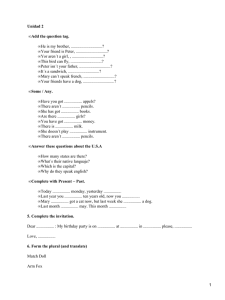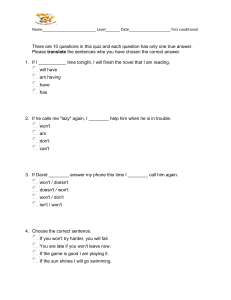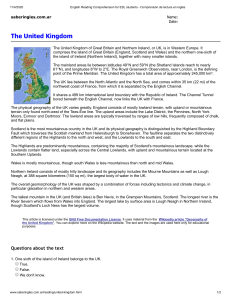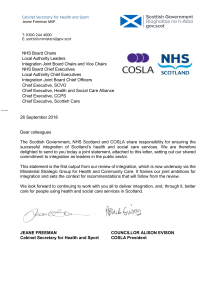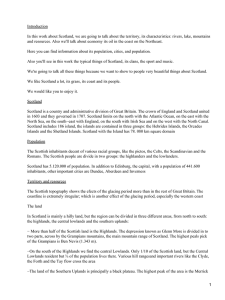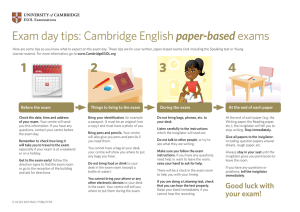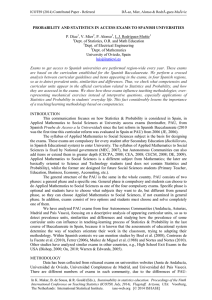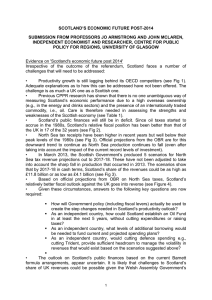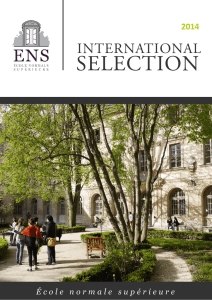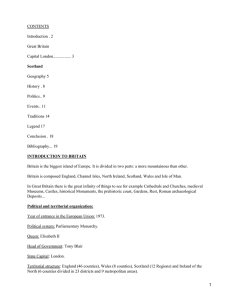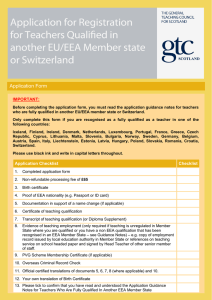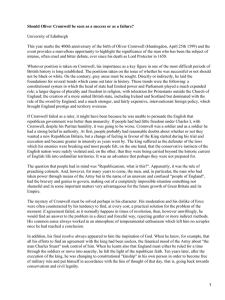Education system in United Kingdom
Anuncio
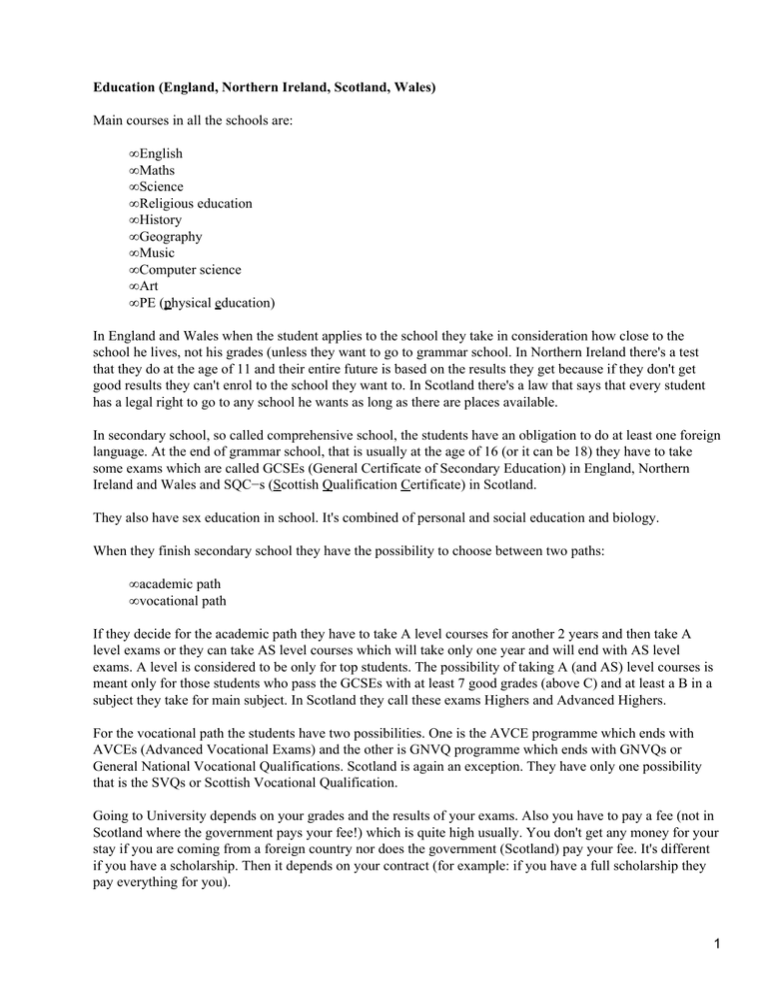
Education (England, Northern Ireland, Scotland, Wales) Main courses in all the schools are: • English • Maths • Science • Religious education • History • Geography • Music • Computer science • Art • PE (physical education) In England and Wales when the student applies to the school they take in consideration how close to the school he lives, not his grades (unless they want to go to grammar school. In Northern Ireland there's a test that they do at the age of 11 and their entire future is based on the results they get because if they don't get good results they can't enrol to the school they want to. In Scotland there's a law that says that every student has a legal right to go to any school he wants as long as there are places available. In secondary school, so called comprehensive school, the students have an obligation to do at least one foreign language. At the end of grammar school, that is usually at the age of 16 (or it can be 18) they have to take some exams which are called GCSEs (General Certificate of Secondary Education) in England, Northern Ireland and Wales and SQC−s (Scottish Qualification Certificate) in Scotland. They also have sex education in school. It's combined of personal and social education and biology. When they finish secondary school they have the possibility to choose between two paths: • academic path • vocational path If they decide for the academic path they have to take A level courses for another 2 years and then take A level exams or they can take AS level courses which will take only one year and will end with AS level exams. A level is considered to be only for top students. The possibility of taking A (and AS) level courses is meant only for those students who pass the GCSEs with at least 7 good grades (above C) and at least a B in a subject they take for main subject. In Scotland they call these exams Highers and Advanced Highers. For the vocational path the students have two possibilities. One is the AVCE programme which ends with AVCEs (Advanced Vocational Exams) and the other is GNVQ programme which ends with GNVQs or General National Vocational Qualifications. Scotland is again an exception. They have only one possibility that is the SVQs or Scottish Vocational Qualification. Going to University depends on your grades and the results of your exams. Also you have to pay a fee (not in Scotland where the government pays your fee!) which is quite high usually. You don't get any money for your stay if you are coming from a foreign country nor does the government (Scotland) pay your fee. It's different if you have a scholarship. Then it depends on your contract (for example: if you have a full scholarship they pay everything for you). 1 The schedule in secondary schools in UK is different than our schedule. The school starts at 09.10h and lasts until 15.40h. At 13h they have a lunch break until 14h (in some schools 12.30h − 13.30h). Before the school starts they have registration and assembly, usually around 8.30h. In schools they also have assembly previously mentioned above − that is a religious service (collective worship) − and extra curricular activities which are divided into three groups: • Sport (like tennis, football, basketball, rugby, cricket, hockey, fencing, and so on) • Music (band, orchestra, jazz band, 2 choirs*) • Other(army cadette force, scripture union**, PRISM***, Duke of Edinburgh's Award Scheme****, drama classes, reading, etc.) *The choirs are very important in Northern Ireland, TV has some sort of competition to find the best school choir **Promotes Christianity in schools. ***Peace and Reconciliation In School Movement ****Students help their community, do charity, etc. and they try to reach the standards for getting a gold. Practically everyone gets bronze, but the gold is very hard to win. If you win gold you can go hiking for a week and you visit the Buckingham Palace and talk to Duke of Edinburgh in person and it also helps you with you CV (Curriculum Vitae). School calendar: In September they have Prize day and the tops students are given a prize. That is also the day when the students get the results of their A levels. They also have concerts for Christmas, Easter etc. Twice a year they have School Disco and the money goes for charity. The disco is meant for children from 12 to 14 years of age. At the end of the last year they have Formal which is sort of like Maturantski ples − a fancy school dance, all the students are dressed in fancy clothes etc. In UK the rules in schools are stricter than here in Slovenia. The students have to wear a school uniform which is different for each school. Each school has its own emblem and colour of the uniform. They have special uniforms for PE classes. If you are seen doing something wrong while you are wearing a uniform you can be punished by the rules of the school. For example: If you are seen by someone at 12 o'clock at night drinking alcohol with your friends and you are wearing a uniform the person that saw you has the right to call the headmaster of the school and he punishes you the next day. The punishment follow in this order: First you get to write an essay about what you were doing and why was it wrong. Then if you continue to break the school rules you get after school detention (from 15.40h to 17h). The next step is Saturday detention (from 9h − 11h) and if that doesn't help you get suspended. The worst thing that can happen to you is that you get expelled. There's a whole bunch of stuff which you aren't allowed to do: • you aren't allowed to wear make up • you aren't allowed to wear hoop earrings • you aren't allowed to wear piercing • you aren't allowed to wear nail polish • you aren't allowed to let your beard grow • you aren't allowed to have a wild haircut • you aren't allowed to colour your hair pink, green, etc. If you cheat in a small test you get to write an essay or maybe get some after school detention because it is not 2 considered to be such a big deal. But if you cheat in a big test the school refuses to let you set your exams and you have to ask some other school to let you set the exams there but you have to be in the uniform of you own school and it is usually a huge embarrassment because everyone is looking at you and talking about what you did that was so bad that you had to come to their school to set the exams. But anyway, this only happens in Ireland, in England for doing such thing you're disqualified completely. 3
